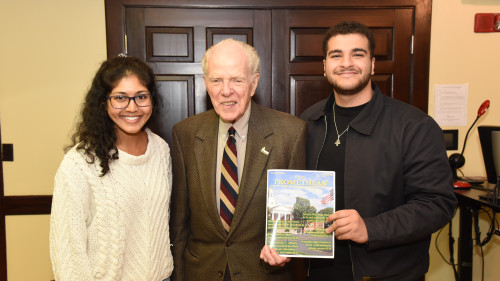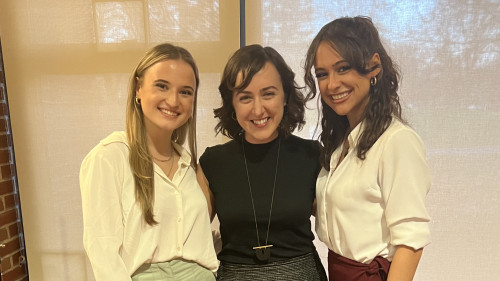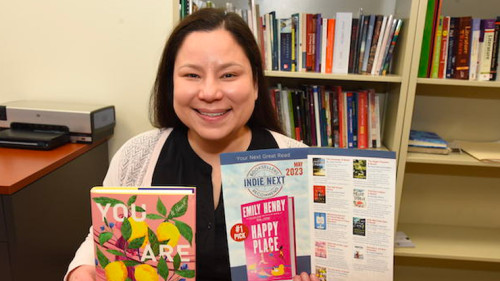
Female classical musicians are making major statements on the stage and on social media. What kind of statements? Ask Sofia Bock ’24.
The English/education major conducted research this past summer on the phenomenon of the “classical music influencer” with Shannon Draucker, Ph.D., assistant professor of English. Their shared passionate interest in the topic resulted in a joint professor-student presentation last fall at the National Women’s Studies Association (NWSA) annual conference, one of the leading conferences in gender and sexuality studies in the U.S. They also had the thrill of meeting Kimberlé Crenshaw, one of the world’s leading feminist scholars.
Their talk, “The 'New’ Classical Music: Performing Feminist Activism on the Social Media Stage,” spotlighted what are called classical music influencers: young, millennial or Gen-Z classical musicians who have developed huge followings on social media platforms like Instagram and TikTok. They argued that by highlighting their work on social media— and, often, critiquing some of the sexist and racist traditions of the classical music world—these influencers are making space for feminist and antiracist politics in the notoriously exclusionary classical music world, according to Draucker.
“Sofia’s excellent research formed the basis of our NWSA talk,” she said. “She is beyond impressive. She not only produced professional-level academic scholarship, but also presented her work at a major national conference, which is highly unusual for an undergraduate.”
Not only was this Bock’s first academic conference, getting to Baltimore also afforded her first plane ride. She must have looked the part – audience members told her they assumed she was a college professor.
”I have literally been thinking about this conference every day since I went,” she said. “It was amazing being in a room with so many people who were all in solidarity with one another.”
The idea for their research came about when Bock shared with Draucker a TikTok posted by Her Ensemble, a free-form group founded to positively impact the gender gap and gender stereotypes in the classical music industry. Draucker herself is an accomplished clarinetist who almost opted for a career in music performance; Bock played violin in her school orchestra growing up. Both were struck not only by the talent and passion on display by Her Ensemble, but by the group’s commitment to making women seen and heard in the exclusionary world of classical music.
“The group is made up of women of different races, religions and cultures, who all showcase their amazing classical music talent,” explained Bock. “In addition to performance, the group examines how women are sometimes talked down to in the classical music world. These women are using social media to make necessary change, and to make classical music more accessible to everyone.”
During their research, Bock and Draucker examined a wide variety of social media posts by women in classical music, especially musicians of color and from the LGBTQ community.
“These posts help us understand that there is a person behind the instrument, behind the plain black performance clothes,” said Bock. “It also shows that social media is not just a big, bad toxic place. It can also be a place of advocacy and justice not only in classical music but in life, if you are willing to share your talents, personal stories and culture.”
Bock, who is currently student teaching at Columbia High School in East Greenbush, also attended a pre-conference workshop on employing feminist pedagogy in K-12 classrooms. She was especially taken with a syllabus that paired music hits by Megan Thee Stallion with popular feminist readings.
“The people there were so welcoming,” she said. “There were students, college professors and veteran K-12 teachers all sharing ideas on making the classroom experience more impactful and more inclusive of feminist and antiracist ideals.”
At a book-signing event before the conference, the pair met Crenshaw, the pioneering feminist scholar who teaches at Columbia University Law School and UCLA. She coined the now ubiquitous term “intersectionality” to describe the double bind of simultaneous racial and gender prejudice. They got to meet her twice more at the conference.
The research and conference travel were sponsored by Siena’s Center for Undergraduate Research and Creative Activity (CURCA).

